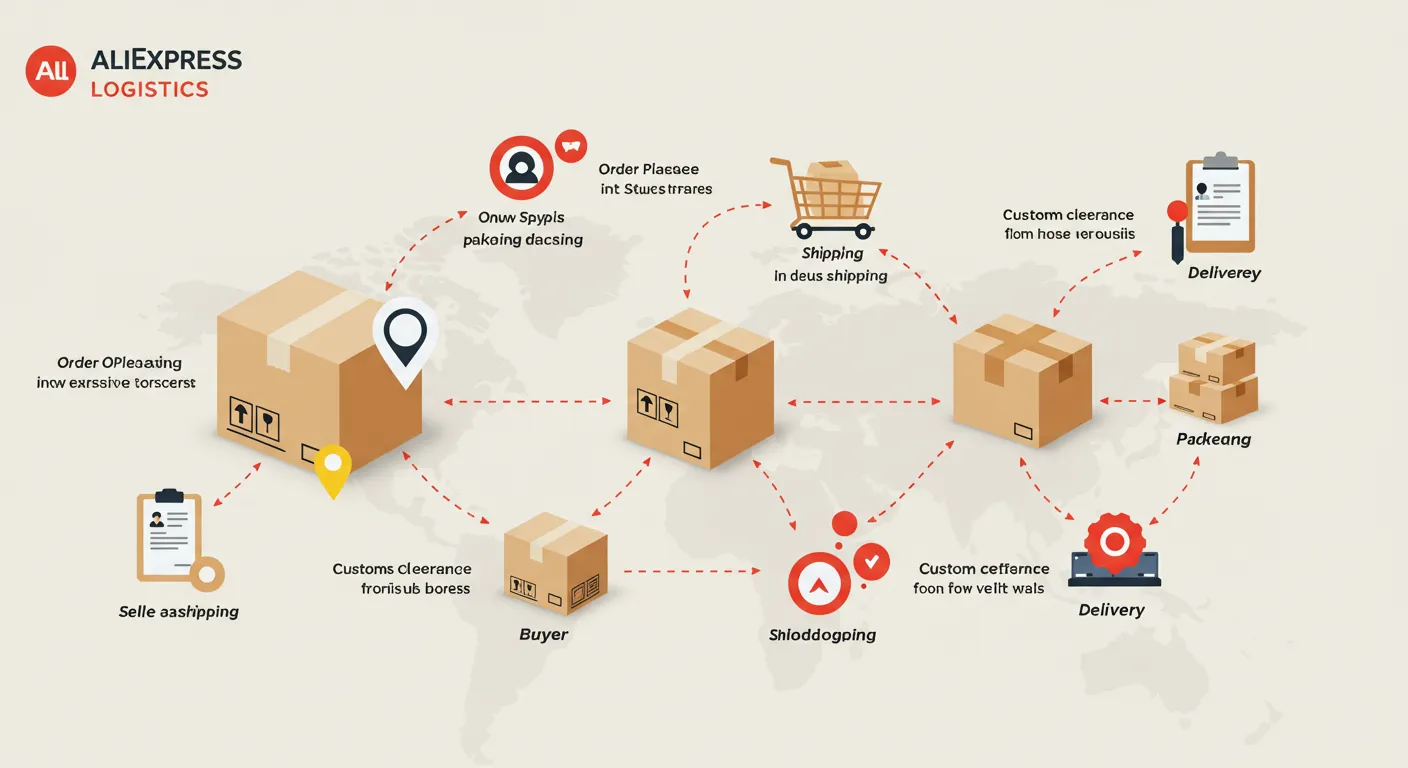Table of Contents
In the fast-paced world of e-commerce, efficient logistics is the backbone of customer satisfaction and business success. AliExpress, a global online retail giant under Alibaba Group, has transformed how goods move from sellers to buyers worldwide through its innovative logistics solutions.
AliExpress Logistics, encompassing platforms like Cainiao and services such as AliExpress Choice, has redefined speed, affordability, and reliability in cross-border shipping.
This article explores how AliExpress Logistics operates, its recent advancements, and its impact on global e-commerce, offering insights into why it remains a competitive force in the industry.
The Evolution of AliExpress Logistics
From Humble Beginnings to Global Reach
AliExpress, launched in 2010, initially relied on traditional shipping methods, which often meant long delivery times of 15 to 45 days for international orders. As the platform grew, so did the demand for faster and more reliable logistics.
AliExpress Logistics emerged as a response, with Cainiao, Alibaba’s logistics arm, playing a pivotal role. Cainiao, established in 2013, integrates advanced technology and partnerships to streamline the supply chain, from warehousing to last-mile delivery.
Today, AliExpress Logistics operates a network of fulfillment centers, sorting hubs, and delivery partners across continents. For instance, in 2023, China’s cross-border e-commerce trade reached 2.38 trillion yuan, with exports growing by 19.6%, largely supported by efficient logistics systems like Cainiao’s. This growth reflects AliExpress’s commitment to meeting the demands of a global customer base.
The Role of Cainiao in AliExpress Logistics
Cainiao is the engine behind AliExpress Logistics, leveraging data-driven solutions to optimize shipping routes and reduce delivery times.
By collaborating with over 3,000 logistics partners worldwide, Cainiao ensures seamless coordination between sellers, warehouses, and customers. Its central hub in Europe, opened recently, has enhanced AliExpress’s ability to serve markets like Germany, France, and Spain, reducing delivery times significantly.
This expansion is part of a broader strategy to compete with e-commerce giants like Amazon and emerging players like Temu and Shein.
Cainiao’s technology, including AI-powered route optimization and real-time tracking, allows customers to monitor their orders with precision. This transparency has boosted trust, a critical factor in cross-border e-commerce where buyers often worry about delays or lost packages.
The Role of Linehaul Offices in AliExpress Logistics
Critical Hubs: Linehaul offices, operated by Cainiao, manage long-distance package transport between warehouses, sorting centers, and distribution points, ensuring smooth cross-border logistics for AliExpress.
Cost Optimization: By consolidating shipments, these offices reduce costs, making AliExpress Logistics an affordable solution for global e-commerce.
Strategic Locations: Located in China, Europe, and Southeast Asia, they handle millions of packages daily, supporting over 20,000 merchants monthly.
Advanced Technology: AI-driven route optimization and real-time tracking minimize delays, with Cainiao’s European hub (launched 2023) cutting delivery times by 30% in markets like Germany and Spain.
Sustainability Efforts: Linehaul offices maximize load efficiency and use electric vehicle fleets for last-mile delivery (introduced 2024), reducing carbon emissions.
Reliability and Speed: They enable AliExpress Choice’s 5-15 day shipping, bridging origin and destination for reliable service.
Resilience: Despite fluctuating freight rates, linehaul offices maintain affordability and operational efficiency.
Future Importance: As e-commerce grows, linehaul offices will remain key to AliExpress Logistics’ competitive edge.
Also Read: Transforming Your Ride: A Guide to Automotive Styling and Vehicle Customization
Key Features of AliExpress Logistics
AliExpress Choice: A Game-Changer for Speed and Affordability
One of the standout innovations in AliExpress Logistics is the AliExpress Choice program, launched to offer faster shipping and competitive pricing.
Choice consolidates orders from top suppliers and logistics providers, ensuring delivery within 5 to 15 days in key markets like the United States and Europe. This is a significant improvement over standard shipping, which can take up to 45 days.
The program also offers free or low-cost shipping on select items, making it attractive for cost-conscious shoppers. For example, in 2024, AliExpress reported a 60% year-over-year increase in order volume, largely driven by Choice’s appeal.
By prioritizing high-demand products and streamlining logistics, AliExpress Choice has positioned the platform as a leader in affordable, rapid delivery.
Semi-Managed and Fully Managed Models
AliExpress Logistics introduced semi-managed and fully managed models to cater to diverse seller needs. The semi-managed service, which marked its 100-day milestone in April 2024, supports over 20,000 merchants monthly by handling logistics from warehousing to shipping.
This allows small and medium-sized businesses to focus on product development while AliExpress Logistics manages the complexities of global delivery.
The fully managed model, on the other hand, collaborates with top-tier suppliers to offer lower prices and faster services. This approach has been particularly successful in markets like South Korea, where AliExpress’s meteoric rise is attributed to its ability to deliver high-value products quickly and affordably.
AliExpress Premium and Local+ Services
For customers seeking expedited delivery, AliExpress Premium offers faster shipping options, typically within 7 to 15 days. This service targets buyers willing to pay a premium for speed, catering to urgent needs like holiday shopping.
Additionally, AliExpress’s Local+ service, launched in Europe in 2025, enables local sellers to leverage AliExpress’s platform and logistics network, competing directly with Amazon’s localized fulfillment centers.
Local+ integrates regional warehouses to reduce delivery times to as little as 1 to 3 days in select European markets. This initiative not only boosts AliExpress’s competitiveness but also supports local businesses by providing access to a global customer base.
Technological Innovations Driving AliExpress Logistics
AI and Data Analytics
AliExpress Logistics relies heavily on artificial intelligence and data analytics to optimize its operations. Cainiao’s smart logistics platform uses AI to predict demand, optimize inventory placement, and select the most efficient shipping routes.
For instance, during peak shopping events like Black Friday, Cainiao’s algorithms analyze historical data to pre-position high-demand items in warehouses closer to key markets, reducing delivery bottlenecks.
Real-time tracking, powered by Cainiao’s data infrastructure, provides customers with updates on their packages’ status, from dispatch to delivery. This transparency has been a key differentiator, especially in markets where trust in cross-border e-commerce is still developing.
Sustainability Initiatives
AliExpress Logistics is also making strides in sustainability. Cainiao has introduced eco-friendly packaging and optimized delivery routes to reduce carbon emissions.
In 2024, Cainiao partnered with electric vehicle providers for last-mile delivery in select regions, aligning with global trends toward greener logistics. These efforts resonate with environmentally conscious consumers and enhance AliExpress’s brand reputation.
Challenges and Opportunities
Navigating Global Competition
While AliExpress Logistics has made significant strides, it faces fierce competition from platforms like Amazon, Temu, and Shein. Amazon’s Prime service, with its same-day or next-day delivery in many markets, sets a high bar. However, AliExpress Logistics counters this with its affordability and vast product selection, appealing to budget-conscious shoppers worldwide.
Temu and Shein, with their focus on low-cost fashion and rapid delivery, pose a threat in specific niches. AliExpress Logistics addresses this by diversifying its offerings and enhancing its semi-managed and fully managed models to support a wide range of sellers. The platform’s ability to scale logistics operations while maintaining low costs gives it a competitive edge.
Addressing Customer Expectations
One of the biggest challenges for AliExpress Logistics is meeting rising customer expectations for speed and reliability. While AliExpress Choice and Premium services have reduced delivery times, standard shipping options still lag behind competitors in some regions.
To address this, AliExpress is investing heavily in logistics infrastructure, with plans to spend $200 million in 2024 on a new logistics center to support small and medium-sized enterprises.
Expanding into New Markets
AliExpress Logistics is poised for further growth, particularly in emerging markets like Southeast Asia and Latin America. The platform’s expansion into Europe, with Cainiao’s central hub, serves as a blueprint for entering new regions.
By tailoring logistics solutions to local needs—such as offering cash-on-delivery in markets with low credit card penetration—AliExpress can capture a larger share of the global e-commerce market.
The Impact of AliExpress Logistics on Global E-Commerce
AliExpress Logistics has democratized access to global markets for both sellers and buyers. Small businesses, previously limited by logistical barriers, can now reach customers worldwide through AliExpress’s semi-managed and fully managed models.
For consumers, the platform offers unparalleled affordability and variety, supported by a robust logistics network.
The success of AliExpress Logistics is evident in its numbers. In September 2023, AliExpress reported a 70.2% year-over-year sales increase, driven by its logistics innovations. Similarly, its international division, including AliExpress, saw a 45% revenue surge from January to March 2024, underscoring the critical role of logistics in its growth.
Conclusion
AliExpress Logistics, powered by Cainiao and innovative services like AliExpress Choice and Local+, has transformed the e-commerce landscape. By leveraging technology, strategic partnerships, and a customer-centric approach, AliExpress has made global shopping faster, more affordable, and reliable.
While challenges like competition and evolving customer expectations remain, AliExpress Logistics is well-positioned to lead the industry through continued investment in infrastructure and sustainability.
As e-commerce continues to grow, AliExpress Logistics will play a pivotal role in shaping the future of global trade, connecting sellers and buyers across borders with unprecedented efficiency.





